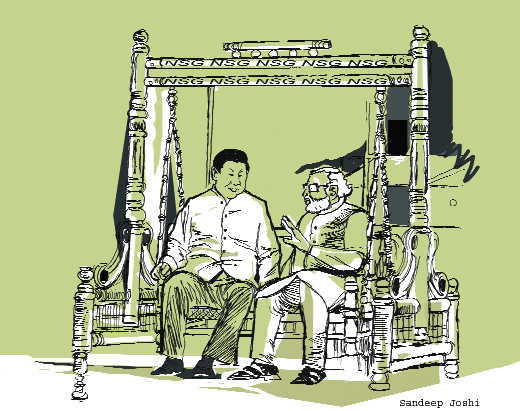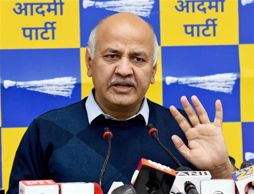
M. K. Bhadrakumar
Sweet are the uses of adversity/Which, like the toad, ugly and venomous/Wears yet a precious jewel in his head,” writes William Shakespeare. Indeed, the humiliating defeat India suffered while attempting to gatecrash into the plenary of the Nuclear Suppliers Group in Seoul last weekend is a matter of deep anguish and indignation, but also provides useful markers on why the foreign policy establishment fumbled so miserably.
The NSG saga exposed that personalised diplomacy has severe limits. Prime Minister Narendra Modi will be a wiser man. But his prestige should never have been risked. The establishment ought to know that nations doggedly pursue their interests and principles - and personalities cannot make much difference. Quite obviously, Switzerland, Brazil, South Africa, Austria, Ireland, New Zealand, Turkey, and China - and many others - in the 48-member NSG have established policies on nuclear non-proliferation.
Therefore, the decision to engage the Chinese leadership at the highest level was entirely avoidable. It remains unclear what gave the foreign-policy establishment the confidence that a demarche by our Prime Minister with President Xi Jinping will compel Beijing to change its principled policy brief. Ironically, Chinese media had even alerted our establishment repeatedly - three op-eds within the week in Global Times - that we were misreading the situation and making grave miscalculations. Nonetheless, our Prime Minister was pressed into service.
(Follow The Tribune on Facebook and Twitter @thetribunechd)
The India-China relationship is passing through an indifferent patch. Our Prime Minister had avoided meeting the Chinese leader for almost a year. Ever since joining hands with the US on the infamous Joint Vision Statement on Asia-Pacific (January 2015), China's attitude has become distant. Beijing senses that hardliners in the Indian foreign and security policy establishment are ruling the roost and our political leadership is incapable or unwilling to take course correction.
The series of nasty things we did with deliberation and planning through the period since January last year to hurt China's core interests betray a hostile mindset. Was the Prime Minister unaware that a hardline lobby was at work, determined to block his intentions of transforming the Sino-Indian relationship and making it an underpinning for his development agenda? There are no easy answers.
This hardline lobby manipulated the discourse over the NSG issue and made it a bilateral India-China tangle. The NSG membership question involves highly complex considerations over the future trajectory of the nuclear non-proliferation regime. The NSG was created in 1975 by the Americans in the specific context of our Pokhran tests as the platform to pursue a containment strategy against India by denying it advanced technology. (China became NSG member only in 2004.) If India joins the NSG, the grouping will no more be the same.
The statement issued after the plenary at Seoul in the weekend underscored the bottom line: "Participating governments reiterated their firm support for the full, complete and effective implementation of the NPT as the cornerstone of the international non-proliferation regime". It is futile to make this an India-China issue. As the NSG's 'founder' and patron saint, it is incumbent upon Washington to prepare the ground for India's admission. (The 2008 US-India nuclear deal makes it obligatory, too.) Yet, Washington has found it expedient to confine itself to making pious statements because yet another discord in the Sino-Indian normalisation works to its greater advantage. Washington preferred to covertly encourage its proxies within the Indian establishment to turn the NSG issue into the stuff of "China-bashing". Washington's calculation is that the snowballing negative opinion regarding China among the Indian public will help expedite the Logistics Agreement giving access for US forces to Indian military bases.
The Indian establishment overlooks the international milieu. In particular, the steady decline in the US' influence in global politics; the US' cascading tensions with Russia and China; the unravelling of the Western alliance system (which will be hastened by Brexit), growing "multipolarity" in the world order, China's rise and Russia's re-emergence, Sino-Russian entente - all this makes a strong case for India to preserve its "strategic autonomy".
The Indian Navy has just deployed ships on an extended mission in the South and East China Sea. Of course, it was a political decision to show the middle finger at China, coming on top of the trilateral Malabar exercises with the US and Japan, which were held near the disputed waters of the East China Sea. (Chinese war ships 'tailed' ours to make a serious point.) Suffice it to say, our Prime Minister's meeting with the Chinese President at Tashkent seeking support and understanding for our NSG membership had a strange setting.
Remember our catastrophic "forward policy" toward China in the late fifties? There has always been this maverick opinion in our country that it pays to be "tough" toward China. It is an interesting coincidence that as in the fifties, today also, these elements also form part of our "pro-American" lobby. Washington knows exactly who to count on in our foreign-policy establishment to do their bidding and how to raise dust on Raisina Hill. Make no mistake, the US' containment strategy against China is a high-stakes game and India is a 'swing' state. If Carnegie and Brookings recently opened branches in New Delhi and employed ethnic Indians in a coordinated effort to dominate the strategic discourses in our country, it is not an intellectual journey.
The NSG fiasco is not a sideshow. It calls attention to our flawed, US-centric foreign policy. Pakistan has cause to celebrate India's growing isolation. All that was needed was for the adviser on foreign affairs, Sartaj Aziz, to make a few phone calls to remind select world capitals to voice their opinions at the Seoul plenary. (Interestingly, Kazakhstan, which was once "denuclearised" and frog-marched into the NPT, was also on Aziz's list.)
Whereas, our Prime Minister travelled to Bern, flew from there to Washington, made a quick detour to Mexico City, and returned home to make a phone call to Moscow and thereupon travel to Tashkent. What was all this hyperactive diplomacy about? All four of India's BRICS partners have remained passive or voiced opposition to India's NSG membership - and the majority within the NSG swears by the NPT. And, as for the US, it refused to stand up and be counted, being mindful of Pakistani sensitivities.
The NSG setback inevitably casts a shadow on our case for membership of the UN Security Council. A post-mortem is needed and responsibility should be pinned for causing damage to India's standing as a responsible member of the international community. Alas, the Prime Minister's carefully cultivated image as an influential world statesman has been dented too - perhaps, irreparably.
The writer is a former Ambassador.



























